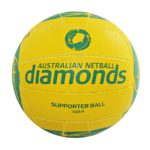 A few days back I stumbled onto an example of one of the sports clubs that, despite being ranked highly by the Australian Sports Commission as being potentially worthy of a federal government sports grant, had been turned down by the Federal Sports Minister. The Victorian soccer club in question had been assessed by the ASC (Australian Sports Commission) on a ranking scale between zero and one hundred as a score of 87. Given that the ASC’s cut-off rank for “deserving” applications was 71 out of 100 the club should have been a shoo-in for a grant if applications had been assessed on merit.
A few days back I stumbled onto an example of one of the sports clubs that, despite being ranked highly by the Australian Sports Commission as being potentially worthy of a federal government sports grant, had been turned down by the Federal Sports Minister. The Victorian soccer club in question had been assessed by the ASC (Australian Sports Commission) on a ranking scale between zero and one hundred as a score of 87. Given that the ASC’s cut-off rank for “deserving” applications was 71 out of 100 the club should have been a shoo-in for a grant if applications had been assessed on merit.
Twitter war
I posted a tweet about the little club’s misfortune and made the point that (using the university grading example) sometimes a borderline pass or credit receives greater rewards than a high distinction. The fact that my tweet received a significant number of retweets did not surprise me but the content of the comments I received in response to my tweet did. One of the earliest comments posted made the point that soccer, being one of the richest sports in the world, should support its own clubs and no soccer clubs should ever receive grants. Several soccer supporters responded to this tweet by attacking the original tweeter (whose twitter page showed his clear allegiance to AFL) and claiming that AFL is a much richer sport than soccer that already receives lots of government support so no AFL clubs should ever be given grants.
I couldn’t believe it. An original tweet of mine that had given a specific example of a community grass-roots sporting association that had fallen victim to government rorting of a grant application process had now become fuel for a code versus code twitter war!
It gets worse!
That wasn’t the end of it. Along with the pro soccer tweeters and the pro AFL tweeters raging at each other a new group of anti-professional sports advocates joined the fray. The next comment to arrive was from a bloke that claimed that all sports that had professional arms (AFL, Rugby League, Basketball, Soccer etc) should be responsible for the supporting of their grass roots clubs and should be automatically excluded from any grant considerations.
Has this entire country gone nuts? How can an original tweet with such a straight-forward message about grass roots communities being ripped off so easily be distorted into a battle between the tribes?
Academic Anne Tiernan made the point on ABC Radio National this morning that governments responsible for self-serving decision making happily promote “hyper-partisan tribalism” and cynicism of everyday folk because it deflects attention from their own lack of fairness in their stewardship of the public dollar. While Anne was referring to the hyper-partisan behaviour of the political tribes the point she was making is just as important here. This is no time for the AFL tribe to be attacking the soccer tribe. It’s no time for the Rugby tribe to be attacking the Rugby League tribe. Its no time for the “poor” amateur sports to be attacking the “wealthy” pro sports either. Even among relatively wealthy sports there are many grass roots clubs and organizations that barely manage to keep their activities going. It takes collaboration and community action among grass roots sports people to demand accountability and integrity from government decision-makers.
Unconventional alliances needed
Tierney called for “unconventional alliances” to scrutinize the behaviour of politicians and to demand fairness. This not only applies in the political sphere. It also applies in the community sporting arena. There is nothing quite so unconventional as soccer supporters joining hands with AFL supporters and Rugby League supporters. In fact, it’s downright weird. It may be weird, but it is also necessary. Politicians who are elected to serve the needs of their communities rather than to serve their own needs should be held accountable by all community sports participants to distribute public funds to the areas of greatest need and value.

Leave a Reply